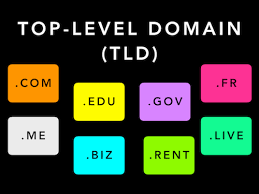Hello!
 The Internet Corporation for Assigned Names and Numbers (ICANN) approved one of the biggest changes to the domain name system (DNS).
The Internet Corporation for Assigned Names and Numbers (ICANN) approved one of the biggest changes to the domain name system (DNS).
ICANN allows companies to create and control custom generic top-level domains (TLDs).
Previously, companies were restricted to specific TLDs like .com, .org, .net, and .edu. The .com TLD is often the most favorable choice if you’re looking to purchase premium domain names. Let’s assess the potential impact of new TLDs on your business/brand.
Understanding the Domain Name Structure
Internet domains feature a TLD, second-level, and lower-level domain (sometimes). In a typical domain name like “www.xyz.com,” the .com part is the generic TLD, while the XYZ part is the second-level domain. Businesses historically had to choose from a limited number of TLDs and acquire the rights to the second-level domain.
The new changes from ICANN no longer restrict companies to the former TLDs. Your company can now claim custom generic TLDs (gTLDs). Instead of “www.businessname.com,” the company can use a custom .businessname TLD and create pages like “www.home.businessname” and emails like “[email protected].” Companies can develop unique TLDs to set their businesses apart from other websites that try to use misspellings and unbought TLDs.
Implications of New TLDs on Your Business/Brand
 Not all companies find custom gTLDs realistic.
Not all companies find custom gTLDs realistic.
Prohibitive expenses and the workload required to register such domains limit the number of companies that can customize their TLDs.
The new developments can impact the structure and use of the internet, whether or not you register a custom gTLD. Here are some of the implications to think about:
1. Trademark Infringement
Allowing companies to register custom gTLDs creates a situation where businesses can use your trademarks, company name, or brand. ICANN plans to publish all approved gTLDs from the first round of applications. Third parties can object to the application on various grounds, including violating intellectual property rights. If you have a registered trademark, brand, or company name, you can prevent other organizations from registering the gTLD as their own.
Filling an objection involves a fee; you must prove that the TLD is a registered trademark. This requires keeping tabs on all notifications from ICANN to prevent infringement before it impacts your business. Such infringements can impact profitability, especially once people become fond of the new gTLDs. If you have the rights to a second-level domain with a .com extension, consider registering the trademark/brand as a unique gTLD.
2. Industry Takeover
 Businesses must pay attention to applications that seek to register gTLDs containing general terms. Some TLDs like.SEO and .
Businesses must pay attention to applications that seek to register gTLDs containing general terms. Some TLDs like.SEO and .
Computers feature terms covering an entire business sector or industry. If entrepreneurs or competitors try to register such TLDs, ICANN allows you to file an objection. Your objection may be valid if the registrant isn’t a legitimate representative of the entire sector.
If the registrant is a legitimate representative, consider acquiring a second-level domain. For instance, if a trade association registers.SEO as their TLD, you can purchase www. (company name).SEO. Acquiring such second-level domains involve going through private registry operators. The process differs from acquiring a second-level domain with a .com extension, and prices are expected to be higher.
3. Unique Pros/Cons
 New TLDs present an opportunity for more customization and control over your brand. Being a registry holder for custom gTLDs also carries prestige, but premium domain names still offer the best route to success. This is because the .com gTLD remains the most popular and easily recognized, so you need it whether or not you register a custom name. A registry holder also has to pay more to keep a brand-specific gTLD.
New TLDs present an opportunity for more customization and control over your brand. Being a registry holder for custom gTLDs also carries prestige, but premium domain names still offer the best route to success. This is because the .com gTLD remains the most popular and easily recognized, so you need it whether or not you register a custom name. A registry holder also has to pay more to keep a brand-specific gTLD.
The initial and ongoing registration, technical maintenance, and administration for custom gTLDs are more expensive than conventional gTLDs. Companies looking to register such domains need time and financial commitment to leverage the potential benefits.
The new gTLDs are unfamiliar to the public and require time to become the norm. Most people still look for .com extensions, which are seen as the most authentic variations of the website.
Also read:
- From Startup to Sale
- Nine Essentials Ways to Safeguard Privileged User Accounts and Protect Your kingdom
- 5 Fresh Content Ideas that Work on Winter Holidays
Purchasing Premium Domain Names
 If you plan to launch a successful online business, purchasing premium domain names is one area to prioritize. Most people look for the .com domain name, but you need the accompanying second-level domain to be short and easy to remember.
If you plan to launch a successful online business, purchasing premium domain names is one area to prioritize. Most people look for the .com domain name, but you need the accompanying second-level domain to be short and easy to remember.
Stick to super-premium domain names that are easier to brand and market to your customers. Keep tabs on new ICANN developments to determine if you want to become a registry holder or object to someone overtaking your trademark.
Thank you!
Join us on social media!
See you!






